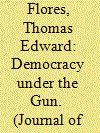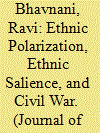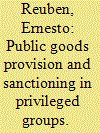|
|
|
Sort Order |
|
|
|
Items / Page
|
|
|
|
|
|
|
| Srl | Item |
| 1 |
ID:
085981


|
|
|
|
|
| Publication |
2008.
|
| Summary/Abstract |
This article explains the strength of the 'ODM wave' in the 2007 Kenyan election and the popular rejection of Daniel arap Moi's call to re-elect President Mwai Kibaki across the Kalenjin areas of the Rift Valley. It examines the election campaigns, voting patterns, and aftermath of the contested election, and reveals why most Kalenjin dismissed Moi's pleas as self-interested and were instead drawn towards the pledges and leadership of the Orange Democratic Movement (ODM). The article discusses how a strongly ethnicized discourse of 'persecution' and 'bias' was interwoven with narratives of past and potential 'injustice', leading to the vilification of the Kibaki regime and the casting of ODM as the vehicle of 'meaningful change'. In addition, it argues that local understandings and interpretations of the past and present provide the relevant context for understanding subsequent violence and attacks on the Kikuyu community.
|
|
|
|
|
|
|
|
|
|
|
|
|
|
|
|
| 2 |
ID:
086002


|
|
|
|
|
| Publication |
2009.
|
| Summary/Abstract |
This article empirically examines how natural resources affect the severity of armed civil conflict. It finds that drug cultivation in the conflict area is associated with less severe conflicts but that gemstone mining and oil and gas in the conflict zone production increase the severity of conflicts. Most severe are secessionist conflicts in regions with hydrocarbon production. Interestingly, oil and gas production outside the conflict zones is related to less severe conflicts. Measured at the country level, none of the resource variables has an effect on conflict severity. These results have four implications. First, availability of natural resources affects the severity of armed civil conflict. Second, the location of resources is crucial to their impact on conflict. Third, the type of resource matters. Above all, it seems that natural resources affect conflict severity by altering incentives for both the rebel group and the state
|
|
|
|
|
|
|
|
|
|
|
|
|
|
|
|
| 3 |
ID:
086000


|
|
|
|
|
| Publication |
2009.
|
| Summary/Abstract |
Increasingly, scholars studying civil conflicts believe that the pace of postconflict economic recovery is crucial to a return to peaceful politics. But why do some countries' economies recover more quickly than others'? The authors argue that the inability of politicians to commit credibly to postconflict peace inhibits investment and, hence, slows recovery. In turn, the ability of political actors to eschew further violence credibly depends on postconflict political institutions. The authors test this framework with duration analysis of an original data set of economic recovery, with two key results. First, they find that postconflict democratization retards recovery. Second, outright military victory sets the stage for a longer peace than negotiated settlements do. This research deepens the understanding of the bases of economic recovery and conflict recidivism in postconflict countries and points to future research that can augment this knowledge further still.
|
|
|
|
|
|
|
|
|
|
|
|
|
|
|
|
| 4 |
ID:
055215


|
|
|
| 5 |
ID:
086001


|
|
|
|
|
| Publication |
2009.
|
| Summary/Abstract |
This article examines how the relationship between ethnic polarization and civil war could be moderated by different degrees of ethnic salience. Using an agent-based computational model, we analyze the polarization-conflict relationship when ethnic salience is ``fixed''-high for every member of two nominally rival ethnic groups- and ``variable''-permitted to vary across individuals as a function of relative income. We find that (1) when salience is fixed, conflict onset is twice as high at low levels of polarization compared to when salience is permitted to vary, with the difference decreasing at high levels of polarization; (2) the relationship between conflict onset and the range over which we calculate variable salience is positive and robust for low and moderate levels of polarization; (3) the relationship between polarization and conflict onset is robust even under minority domination, if one holds salience fixed; and (4) holding ethnic salience fixed effectively amplifies the negative effect of polarization on economic performance.
|
|
|
|
|
|
|
|
|
|
|
|
|
|
|
|
| 6 |
ID:
086005


|
|
|
|
|
| Publication |
2009.
|
| Summary/Abstract |
This study investigates the psychological effects of a set of societal beliefs termed the ethos of conflict, which develops in the context of intractable conflict-as, for example, the Israeli-Arab conflict. The premise was that the ethos of conflict constitutes a type of ideology that serves as a powerful prism through which individuals perceive the reality of an intractable conflict. The study's findings confirmed this premise, showing that participants with a high level of ethos of conflict tended to perceive photos depicting encounters between Jews and Palestinians differently than did those with a low level of ethos of conflict. The former tended to perceive the Palestinians as more aggressive, to blame them more for such attributed aggressiveness, and to explain this perceived aggressiveness more in terms of internal and stable causes. They also tended to stereotype Palestinians more negatively and Jews more positively.
|
|
|
|
|
|
|
|
|
|
|
|
|
|
|
|
| 7 |
ID:
086006


|
|
|
|
|
| Publication |
2009.
|
| Summary/Abstract |
The purpose of this study is to explore the relationship between the secret negotiations and the public rhetoric of Palestinian and Israeli leaders leading up to the Oslo I Accords. To accomplish this goal, we coded public statements made by Israeli and Palestinian leaders in the months preceding the accords and the events that unfolded during the talks. We hypothesized that the Palestinian leaders, as nonstate actors, would engage in outbidding by showing a more aggressive, backward-looking orientation in public. Israeli leaders, as state actors, would engage in frontstage-backstage behavior and display a more balanced public rhetoric. The results showed that the Palestinians focused on justice issues framed as mistrust and backward looking. This public framing was associated with retreat in the private talks. In contrast, the Israelis switched between positively and negatively framed rhetoric with forward-looking and affiliative statements correlated with lack of progress and backward-looking and mistrust rhetoric associated with progress in the talks.
|
|
|
|
|
|
|
|
|
|
|
|
|
|
|
|
| 8 |
ID:
086003


|
|
|
|
|
| Publication |
2009.
|
| Summary/Abstract |
In public-good provision, privileged groups enjoy the advantage that some of their members find it optimal to supply a positive amount of the public good. However, the inherent asymmetric nature of these groups may make the enforcement of cooperative behavior through informal sanctioning harder to accomplish. In this article, the authors experimentally investigate public-good provision in normal and privileged groups with and without decentralized punishment. The authors find that compared to normal groups, privileged groups are relatively ineffective in using costly sanctions to increase everyone's contributions. Punishment is less targeted toward strong free riders, and they exhibit a weaker increase in contributions after being punished. Thus, the authors show that privileged groups are not as privileged as they initially seem.
|
|
|
|
|
|
|
|
|
|
|
|
|
|
|
|
|
|
|
|
|